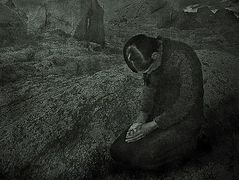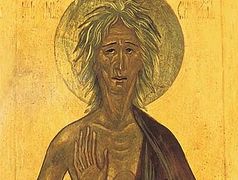And behold, a woman in the city who was a sinner, when she knew that Jesus sat at the table in the Pharisee’s house, brought an alabaster flask of fragrant oil, and stood at His feet behind Him weeping; and she began to wash His feet with her tears, and wiped them with the hair of her head; and she kissed His feet and anointed them with the fragrant oil. Now when the Pharisee who had invited Him saw this, he spoke to himself, saying, “This Man, if He were a prophet, would know who and what manner of woman this is who is touching Him, for she is a sinner.” (Luke 7:37-39)
In the Gospels, sinners are often attracted to Jesus – they seek Him out and are accepted by Him and forgiven their sins. Jesus Himself, as we see in the passage above, was not repulsed by sinners, even those made unclean by their sins. He clearly does not see women as somehow being more unclean or sinful than males. As St Paul says, “all have sinned and fall short of the glory of God” (Romans 3:23). Not only does Jesus not avoid sinners, He welcomes them, “For the Son of man came to seek and to save the lost” (Luke 19:10). All of this gives us good reason to seek Christ if we have sinned – to come to Him in repentance, in confession, in order to be embraced by Him.
Since all have sinned and fall short of the glory of God, in the passage from Luke 7 above we can understand Jesus’ own reaction to the Pharisee who is repulsed by being touched by a sinful woman. Everyone is a sinner, including the self-righteous Pharisee. This is a scene much like that in John 8 with the woman caught in adultery, and Jesus says that the one who is without sin should cast the first stone. There are none without sin. So creating a division between sinners and non-sinners is a completely false narrative. [And Luke 7 and John 8 both reject a double standard in which women are judged more harshly than men for sin, especially sexual sin. A similar idea is present in the Gospel narrative of the hemorrhaging woman in Mark 5:24-34 – misogynistic ideas are rejected.] The dividing line is really between people who seek out God and those who don’t rather than between males versus females or sinners versus non-sinners. We don’t seek out God because we are sinless, we seek God because we know we need God’s love, forgiveness, and mercy. “The LORD is with you, while you are with him. If you seek him, he will be found by you, but if you forsake him, he will forsake you” (2 Chronicles 15:2). “For whoever would draw near to God must believe that he exists and that he rewards those who seek him” (Hebrews 11:6). God rewards those who seek Him, even sinners!
In the novel, The Brothers Karamazov: A Novel in Four Parts, author Fyodor Dostoevsky develops a saintly character, the Elder Zossima. Zossima talks about what it is to “spend the remaining time of one’s life in repentance” as we pray at every liturgical service. Zossima says:
“Do not be afraid of anything, never be afraid, and do not grieve. Just let repentance not slacken in you, and God will forgive everything. There is not and cannot be in the whole world such a sin that the Lord will not forgive one who truly repents of it. A man even cannot commit so great a sin as would exhaust God’s boundless love. How could there be a sin that exceeds God’s love? Only take care that you repent without ceasing, and chase away fear altogether. Believe that God loves you so as you cannot conceive of it; even with your sin and in your sin he loves you. And there is more joy in heaven over one repentant sinner than over ten righteous men [Luke 15:7]—that was said long ago.
Go, then, and do not be afraid. Do not be upset with people, do not take offense at their wrongs. Forgive the dead man in your heart for all the harm he did you; be reconciled with him truly. If you are repentant, it means that you love. And if you love, you already belong to God … With love everything is bought, everything is saved. If even I, a sinful man, just like you, was moved to tenderness and felt pity for you, how much more will God be. Love is such a priceless treasure that you can buy the whole world with it, and redeem not only your own but other people’s sins. Go, and do not be afraid.” (Kindle Loc. 1341-50)




